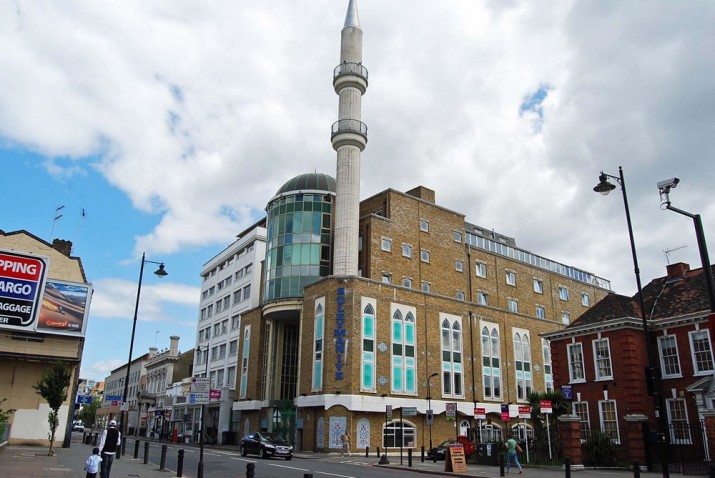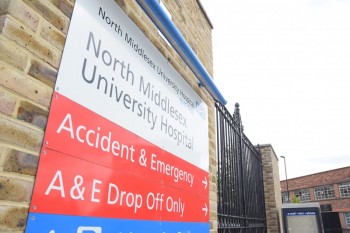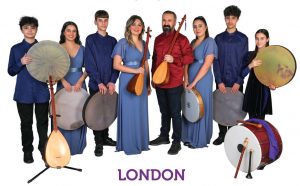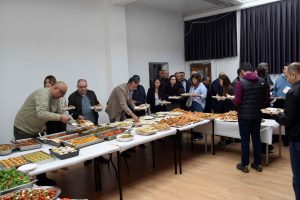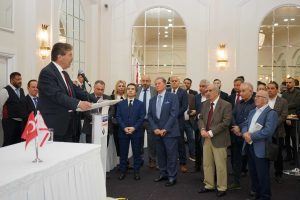The mosque that hosts 10,000 iftars
Akif Çulhaoğlu from the Süleymaniye Cultural Centre tells us about the thousands of people who break their fast together, and the many generous donations they receive
Akif Çulhaoğlu from the Süleymaniye Cultural Centre tells us about the thousands of people who break their fast together, and the many generous donations they receive
By Yasemin Bakan
When was the Süleymaniye cultural centre and mosque established?
We are officially known as the Turkish Islamic Cultural Centre Foundation of Britain. This first started out with the Valide Sultan Mosque in Newington Green, but when space became insufficient the idea was thrown out to build a mosque.
Construction for the Süleymaniye Mosque began in 1994 and opened five years later. Our foundation has 16 branches across Britain and it operates both as a mosque as a centre for education.
How many people can simultaneously attend worship at the Süleymaniye mosque?
1500. Our third and fourth floors are used for boarding and residential purposes. We also have a school in Surrey Quays, just south of the river. During the day our children go to school there and in the evening they come and sleep here. They dine here.
The school has a capacity of 120. Of the students, 85 are middle schoolers while 25 go to college. This figure is rising by the year as new students join us.
At your service, from birth until death
What services does the Süleymaniye mosque offer?
The mosque has all manner of services from birth until death. When children are born, they come here and named, and the adhan is read into their ear. When they reach the age of five or six they come to the mosque to learn about their religion.
They also learn Turkish, because we have Turkish classes here. We offer supplementary classes in mathematics and science. We also teach national cultural and religious values.
These children then grow up and reach the age of marriage, and we marry them. Our mosque has the official authority to wed couples, just like churches. Not every mosque has this authority, but ours does. Couples can get married at the Süleymaniye Mosque once they have presented notice of their intention to wed at the local council.
We also offer circumcision, funerals and other special services. We serve all members of the community – both those who will be buried here, and those who will be sent to Turkey for burial. We have a funeral fund to which congregation members become a member: when they pass away, their funeral expenses are paid outo f this fund.
In addition to all these, we do festivals and campaigns to educate youths and community elders. You can call the mosque not just a community centre but a place where people can come to chat and share troubles.
What do you at Ramadan?
Every evening during Ramadan we put on iftar meals. We host around 300 people each night, both men and women. We supplement these with iftar programmes of events, including Quran readings.
We try to make the most of the month of Ramadan. The iftar table is open to everyone: we follow the “guest of God” principle, meaning all are welcome. We do not turn away anyone who comes to our door.
Who provides the iftars?
We have benefactors who provide these. The person who hosts the iftar will tend to invite people from their immediate network of family and friends. These are supplement by our students and anyone else who happens to be fasting.
Do you only provide iftar meals to Muslims from Turkey?
No. It is a good deed to share your iftar. We regard anyone who fasts to be a Muslim – we do not discriminate based on which country they come from. Our table is open to everyone.
Sometimes people who do not fast want to join our table and we happily invite them. Even when it is hugely busy we do not send anyone away without offering them food.
What would you say regarding zakat and sadaqah offerings?
We redirect the zakat and sadaqah offerings we receive to those in need. We have fund where we collect all the zakat, which is used for the benefit of our students. And this is not just in Britain: there are those in other countries too.
Besides this, we try to ensure the zakat is also sent to people in need in different countries. The categories into which zakat should be divided has already been clearly defined: the poor, the infirm, followers of the Quran. We try to reach them all.
Do you find Ramadan in Britain is different to Ramadan back in Turkey?
Of course Ramadan in Turkey is different. You see notices everywhere that say “Welcome Ramdan”. Everyone rushes to home in time for iftar. We cannot quite find this atmosphere in Britain but we do try to recreate it within our community. We come together with our family and friends to do this.
In Turkey, for example, it is common to open tents where mass iftar meals are served. What we do in Süleymaniye is essentially an iftar tent of sorts. The practice of offering iftar to people passing by, to people who we do not even know, replicates that iftar tent culture in one way.
We organise special readings and events to try and bring Ramadan alive away from our home country, but of course it is not the same as a Muslim country where everyone waits in anticipation for the iftar moment.
Another factor are the long daylight hours in Ramadan, which means a longer fast. But despite all these we try to recreate the Turkish Ramadan culture here.
Do you have any special events planned for this Ramadan?
We have some mosques that have newly opened outside of London. These are places we have never been to before. There will be some programmed events held for Turks living in these areas. They will undertake Ramadan’s traditional rituals – and we of course aim for a wider participation in this year’s iftars.
More people hosting iftars at the mosque
How many people can you host at an iftar here?
We are 150 people together with our students and personnel. But we can host up to 300.
What steps does a benefactor need to follow to host an iftar at Süleymaniye?
We have a daily expense. We split this into three or four, meaning one person provides an iftar for around 300 people. This person then brings their own guests and that makes for the iftar.
We make an announcement during the evening to indicate who was generous enough to host the iftar. It works for the benefactor too: rather than hosting an iftar at home, where they could probably feed 10 people, they can host 300 people here. The benefactor provides an iftar not just for our students and his own guests, but all visitors of God.
What do you think about people who sleep their way through their daily fast?
Some people fast while working in the fields under 40 degree heat. Others fast under an air conditioner, and others still while sleeping. Many fast while continuing their normal lives. Everyone will get the returns for what they endure. “However much pain, that much mercy”, as the old saying goes.
The good deeds of who fasts while harvesting grain under 40 degree heat and he who spends it sleeping cannot be compared. Of course God knows the extent of piety.
Fasting is duty upon us. We must keep it. But while everyone’s prayer is important, it is not all of equal value, and the same goes for fasting. He who struggles more and sacrifices himself more for God will receive its response in good deeds. That is why he who fasts while sleeping and he who continues his regular life are not at one.
What do you think about the increasingly luxurious iftar meals in Turkey?
Muslims should be humble, because our prophet was humble too. The great figures of Islam were all humble. Now everybody may want to set up an iftar table based on their lifestyle: the iftars of a poor man and a businessman will not be the same, of course.
The most important thing is not to waste. As it is written, “eat and drink but waste not by extravagance”. Any waste on the iftar table would defeat the object of fasting in the first place. The reason behind the iftar is for people who have disciplined their nafs and deserved to eat something.
Everyone offers their own kind of iftar but if there are tens of different types of food and these are all thrown away afterwards it would be a waste. And that is wrong.
What is the Süleymaniye mosque’s Ramadan message?
Ramadan is the sultan of the eleven months, a time when morale peaks and grace is extensive. People should forgive themselves and ill feelings dispersed, God willing. May it bring health, peace, comfort and happiness to all.
[otw_shortcode_info_box border_type=”bordered” border_color_class=”otw-silver-border” border_style=”bordered” background_color_class=”otw-silver”]Contact Aziziye
The Aziziye Mosque is based in the North London district of Stoke Newington, near Rectory Road station on London Overground.
Address: 212-216 Kingsland Road, Dalston, London, E2 8AX
Telephone: 020 7684 9900
Fax: 020 7749 4066
Email: info@Süleymaniye.org
Web: www.Süleymaniye.org[/otw_shortcode_info_box]

